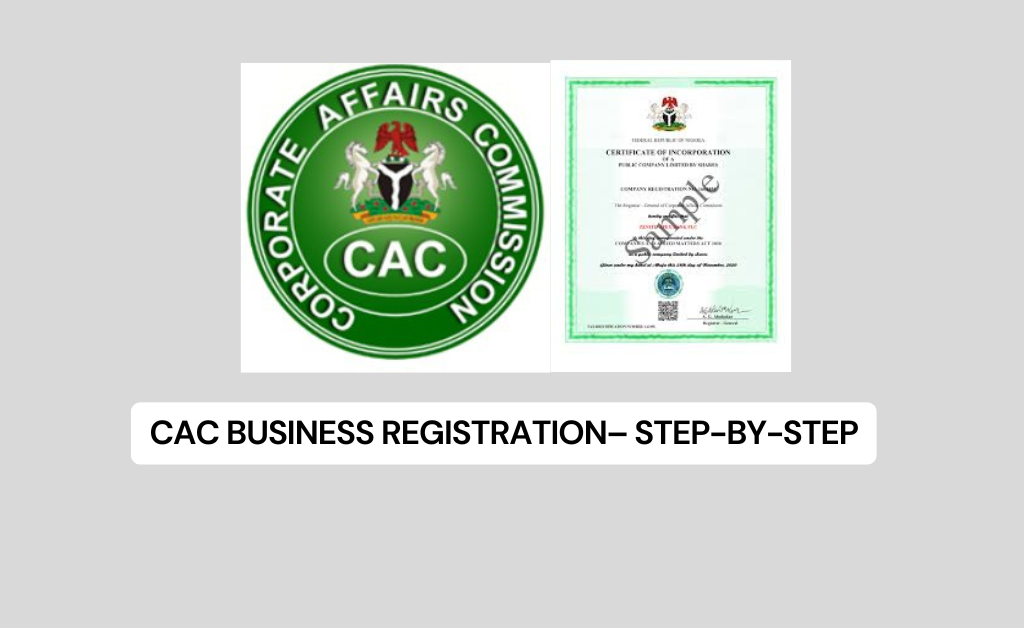Imagine pouring your heart and soul into a brilliant business idea—only to hit a brick wall when you can’t open a corporate bank account, secure that crucial loan, or even comply with tax regulations. The Corporate Affairs Commission (CAC) is the gatekeeper to turning your dream into a legally recognized enterprise in Nigeria. Without CAC registration, you’re invisible in the eyes of banks, investors, and the Federal Inland Revenue Service (FIRS), risking fines, stalled growth, and missed opportunities.
But here’s the good news: you don’t have to navigate this maze alone. As more Nigerian entrepreneurs wake up to the power of formalizing their ventures, registering with the CAC has become not just a bureaucratic checkbox but a strategic leap toward credibility, access to finance, and full compliance with FIRS. In this step‑by‑step guide, you’ll learn exactly what the CAC is, why it matters for your business’s legal standing and financial health, and how to breeze through each stage of the online registration process—so you can focus on what you do best: building your legacy.
What Is the Corporate Affairs Commission (CAC)?
Every thriving business in Nigeria begins with legitimacy—and that legitimacy is granted by the Corporate Affairs Commission (CAC). Established to regulate the formation and management of companies, the CAC serves as the official gatekeeper for bringing your entrepreneurial vision into the formal economy.
Government Agency Responsible for Company Registration
The CAC is a federal agency created under the Companies and Allied Matters Act (CAMA) to handle all aspects of corporate registration and regulation. It ensures that businesses comply with Nigeria’s legal requirements, from incorporation through to annual filings. Without CAC recognition, your enterprise cannot legally operate, open bank accounts in the company’s name, or enforce contracts in court.
Over the years, the CAC has modernized its processes—shifting from paper‐based submissions to a largely online portal—so entrepreneurs across Nigeria can register without having to travel to Abuja or state offices. This digital transformation has reduced wait times and minimized the risk of document loss, making registration more accessible to small and medium‐sized enterprises (SMEs).
Types of Entities Registered by the CAC
The CAC registers several forms of business structures, including Business Names (sole proprietorships), Limited Liability Companies (LLCs), and Incorporated Trustees (for NGOs, clubs, and religious bodies). Each structure carries different legal and tax implications, so it’s crucial to choose the right one from the outset.
For instance, a Business Name is simplest and cheapest but offers no liability protection, whereas an LLC separates personal assets from business liabilities. Incorporated Trustees must meet additional requirements around governance and membership but gain tax exemptions and the ability to receive grants or donations.
Why CAC Registration Matters for New Business Owners
Registering with the CAC grants your business a legal personality, meaning it can own property, enter contracts, and sue or be sued in its own name. This legal status also builds credibility with banks, investors, suppliers, and customers—demonstrating you’re committed to transparency and good governance.
Moreover, CAC registration is the first step toward obtaining a Tax Identification Number (TIN) from the FIRS, which is mandatory for payment of corporate taxes, VAT registration, and claiming government incentives. In short, CAC registration is the keystone of a compliant, growth‑oriented business in Nigeria.
Types of Business You Can Register with CAC
Choosing your business structure is one of the most strategic decisions you’ll make, impacting taxation, liability, and growth potential. This section unpacks the three most common forms: Business Name, Limited Liability Company, and Incorporated Trustee.
Business Name (BN)
A Business Name registration is ideal for sole proprietors and small partnerships. It’s the simplest and cheapest option, requiring minimal documentation and payment. The process typically takes 24–48 hours if all documents are in order.
However, a Business Name does not create a separate legal entity—meaning you, as the owner, are fully liable for all business debts and legal actions. This structure works best for low‑risk ventures where liability protection isn’t a major concern.
Limited Liability Company (LLC)
An LLC is the most popular choice for small to medium enterprises. It creates a distinct legal entity, separating your personal assets from company liabilities. Shareholders’ financial risk is limited to the amount they invest, offering crucial protection in the event of lawsuits or bankruptcy.
LLCs also enjoy easier access to financing and can issue shares to raise capital. They must, however, comply with stricter regulatory requirements—such as appointing directors, filing annual returns, and maintaining statutory registers—making them slightly more complex and costly to maintain.
Incorporated Trustee (NGOs, Clubs, Churches, etc.)
Incorporated Trustees are typically non‑profit organizations—churches, charities, professional associations, or social clubs. This structure grants tax‑exempt status, the ability to receive donations, and access to grants from government and international bodies.
The process demands a formal constitution, a board of trustees, and compliance with governance standards. Annual filings and financial disclosures are mandatory, ensuring transparency and accountability to members and regulators.
Key Differences, Advantages & Who Each Is Best For
In summary, Business Names suit micro‑enterprises and freelancers who need a quick, low‑cost registration. LLCs are perfect for entrepreneurs seeking liability protection and growth capital. Incorporated Trustees meet the needs of non‑profits requiring tax exemptions and the capacity to manage endowed funds.
Assess your venture’s risk profile, funding strategy, and long‑term goals before deciding. Remember, changing your structure later involves additional fees and paperwork, so choose wisely from the start.
What You Need Before You Register
Preparation is half the battle. Gathering the right documents and information before you start the CAC process will prevent delays and rejections.
Valid Means of Identification
You’ll need one form of valid government‑issued ID for each director or proprietor: National Identity Number (NIN), voter’s card, international passport, or driver’s license. These prove the identity of all signatories and are scanned and uploaded to the CAC portal.
Ensure your ID is current—expired documents will be rejected. If you’re using the NIN, confirm your number on the NIMC website to avoid typographical errors that could push your application back into the queue.
Proposed Business Name (Two Options)
Before you begin, brainstorm two unique business names. The CAC will check availability against its database and reserve one if it’s free. Having a backup reduces the risk of restarting your application if your first choice is taken.
Names must comply with CAC guidelines: avoid offensive words, state-specific restrictions, and terms implying government affiliation without approval (e.g., “Federal,” “Nigeria,” “Bank”).
Business Address
Provide a physical address in Nigeria where official correspondence can be sent—P.O. Boxes alone are not acceptable. This may be your office location, co‑working space, or home address for sole proprietors.
Keep in mind this address will be publicly available on the CAC register, so use a professional location rather than your personal residence if privacy is a concern.
Nature of Business / Business Objective
Clearly describe your principal activities—e.g., “retail of electronics,” “digital marketing services,” or “educational consultancy.” This helps the CAC categorize your business and may affect licensing requirements later.
Be broad enough to allow future diversification but specific enough to comply with regulatory frameworks. For instance, “import–export” is too vague without specifying categories of goods.
Email Address and Phone Number
All notifications—name approval, payment confirmations, and certificate issuance—are sent via email and SMS. Use an address and number monitored by the business owner or secretary to ensure you don’t miss critical updates.
Consider setting up a dedicated business email (e.g., [email protected]) and registering a business‑only SIM card to separate personal from corporate communications.
Step‑by‑Step Process to Register Your Business with CAC Online
Moving through the CAC portal can feel daunting, but breaking it into clear steps makes it straightforward. This section walks you through from name reservation to certificate download.
Step 1: Name Search and Reservation
Begin at https://pre.cac.gov.ng and log in or create an account. Enter your two preferred names into the search tool to check availability.
If your first choice is unavailable, the portal will prompt you to select your second. Once a name is approved, reserve it by paying the reservation fee. Your reservation holds for 60 days, giving you ample time to complete the rest of the registration.
Step 2: Fill the CAC Application Form
After reservation, navigate to the “Incorporation” section and select your entity type. The form will ask for director/proprietor details, business address, share structure (for LLCs), and business objectives.
Be meticulous: mismatched or missing information (e.g., incorrect NIN digits) is the most common cause of application rejection. Save your progress frequently, and double-check every field before submission.
Step 3: Payment of CAC Fees
Fees vary by entity type—approximately ₦10,000 for a Business Name and ₦30,000–₦50,000 for an LLC, depending on share capital. Payment is made via Remita using your reserved name code.
Keep electronic receipts and reference numbers safe; you’ll need them if any payment discrepancies arise. Payment clears instantly, allowing you to proceed to document upload without delay.
Step 4: Document Upload and Submission
Upload scanned copies of all required documents: ID, passport photos, signature pages, and any supporting affidavits. Ensure files are legible, correctly formatted (PDF or JPEG), and within size limits.
Common pitfalls include blurred scans, mismatched signatures, and incorrect file types. Review each upload carefully—once you submit, you cannot replace documents without restarting the application.
Step 5: Approval and Certificate Issuance
Upon successful review (typically 24 hours to 5 business days), you’ll receive an SMS and email notification. Log in to the CAC portal, navigate to “My Submissions,” and download your digital certificate of incorporation.
Print multiple certified copies for your records and for submission to banks, regulatory agencies, and investors. Store a high‑resolution PDF securely—this document is your business’s legal badge of honor.
How Much Does It Cost to Register a Business with CAC?
Understanding the cost breakdown helps you budget accurately and avoid surprise expenses.
Business Name Registration Fees
Registering a Business Name typically costs around ₦10,000, covering name reservation and incorporation. This flat fee makes it the most affordable entry point for sole proprietors.
Additional charges may apply if you exceed standard document limits (e.g., multiple affidavits) or require expedited service through accredited agents.
Limited Liability Company (LLC) Fees
LLC fees start at ₦30,000 for a share capital of ₦100,000. For each additional ₦100,000 in share capital, you pay an extra ₦10,000. Thus, a company with ₦1,000,000 in share capital would incur ₦120,000 in CAC fees.
Don’t forget to budget for annual return filings (₦10,000–₦20,000) and possible stamp duties on share capital, which vary by state.
Incorporated Trustee Fees
Incorporated Trustees pay a base fee of ₦20,000 for name reservation and registration, plus ₦10,000 for filing the constitution. Specialized NGOs may face additional stamp duties or state‐level levies.
Given the complexity of governance documents, many trustees hire legal counsel—budget ₦50,000–₦100,000 more for professional drafting and review.
Additional Costs (Agents, Legal Support, Misc.)
Some entrepreneurs engage CAC‑accredited agents or corporate secretaries to streamline the process—expect service fees of ₦15,000–₦50,000 depending on the package.
Factor in incidental expenses like travel (if you need certified signatures), printing, and professional consultations, which can add another ₦5,000–₦20,000 to your total outlay.
Offline vs. Online CAC Registration
While the CAC portal has simplified registration, some businesses still opt for traditional or hybrid approaches.
Benefits of Online Registration
Online registration is faster, more transparent, and can be completed from anywhere in Nigeria with internet access. You receive real‑time status updates and eliminate the risk of lost paperwork.
The portal’s built‑in validation checks minimize errors, reducing rejected applications. You control every step and can save drafts before final submission, making the process flexible around your schedule.
When to Use a CAC‑Accredited Agent or Lawyer
Businesses with complex structures—multiple directors, high share capital, or non‑profit constitutions—often engage agents to ensure compliance. Agents handle document preparation, filing, and follow‑up, saving you hours of navigational headaches.
However, this convenience comes at a cost. If you’re comfortable with basic web forms and have a straightforward setup (e.g., a single‑member LLC), DIY online registration is both cost‑effective and efficient.
What to Do After CAC Registration
Congratulations—you’ve secured your certificate of incorporation. But formalizing your business doesn’t end there. These next steps cement your legal and operational foundation.
Apply for Your TIN (Tax Identification Number)
Visit the FIRS e‑registration portal and use your CAC certificate to apply for a TIN. This unique number enables you to file corporate income tax, PAYE, and other federal obligations.
Processing can take 7–14 days. In the meantime, begin gathering financial records and signing up for accounting software to streamline your upcoming tax filings.
Open a Business Bank Account
With your CAC certificate and TIN in hand, approach any commercial bank to open a corporate account. Banks typically require proof of address, board resolution (for LLCs), and passport photographs of signatories.
A dedicated business account not only separates personal and corporate finances but also simplifies bookkeeping, loan applications, and audit processes.
Register for VAT (If Applicable)
If your annual turnover exceeds ₦25 million, you must register for Value‑Added Tax (VAT) with the FIRS. VAT registration is done online and links directly to your TIN.
Once approved, charge 7.5% VAT on taxable goods and services, file monthly returns, and remit payments. Non‑compliance attracts penalties, so set up reminders and leverage accounting tools to stay on top of deadlines.
Obtain Industry‑Specific Licenses and Permits
Depending on your business activity—food service, import–export, telecommunications, financial services—you may need additional licenses from sector regulators (e.g., NAFDAC, SON, NCC).
Research requirements early, budget for permit fees, and factor license timelines into your project plan. Operating without these permits can result in fines, product seizures, or business closure.
FAQs: People Also Ask
Here are concise answers to the most searched questions around CAC registration in Nigeria.
How long does it take to register with CAC?
Typically, online registration takes anywhere from 24 hours to 5 business days, depending on the completeness of your documentation and portal workload. Name reservation is almost instantaneous, while certificate issuance can vary based on application complexity.
If you use an accredited agent, they may expedite certain steps, but overall timelines remain similar due to backend processing by the CAC.
Can I register a business myself without an agent?
Absolutely. The CAC portal is designed for self‑service. As long as you meet the documentation requirements and follow each step carefully, you can complete registration without third‑party assistance.
DIY registration saves agent fees and gives you full control of your application—just be prepared to troubleshoot any portal glitches or data‑entry errors on your own.
What are the benefits of registering a Business Name in Nigeria?
Registering a Business Name grants legal recognition, enabling you to open a corporate bank account, access loans, and enforce contracts. It also builds customer confidence by demonstrating your commitment to formal operations.
While it doesn’t provide liability protection, it’s a low‑cost way to separate your personal brand from your business activities and lays the groundwork for eventual incorporation as an LLC.
Can I register my business online in Nigeria?
Yes. The CAC portal (https://pre.cac.gov.ng) handles nearly all aspects of registration—from name reservation to certificate download—without requiring in‑person visits.
You only need internet access, a valid email address, and scanned copies of your documents. For non‑residents, you may appoint a local agent to sign and file on your behalf.
Is CAC registration compulsory for small businesses?
Technically, yes—anyone carrying on business under a chosen name other than their personal one must register. However, enforcement for micro‑enterprises is relatively light.
That said, formal registration unlocks banking services, government incentives, and legal protections that can accelerate growth and shield you from regulatory penalties.
Conclusion
Formalizing your business with the CAC is more than just ticking a regulatory box—it’s the strategic foundation for credibility, compliance, and access to finance. By following this step‑by‑step guide, you can move from informal hustle to a legally recognized enterprise in as little as a few days.
Ready to take your venture to the next level? Gather your documents, head to the CAC portal, and begin the registration process today… then share your success or questions in the comments below or contact us for personalized support!
















Loading comments...
Leave a Comment(Login required)